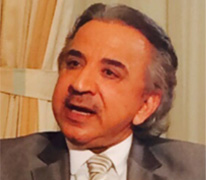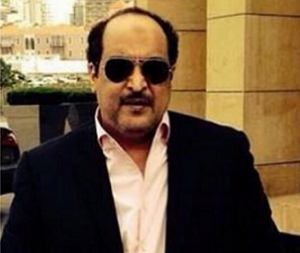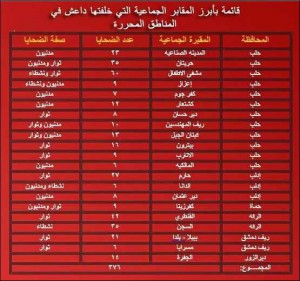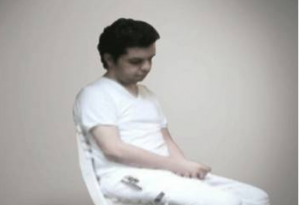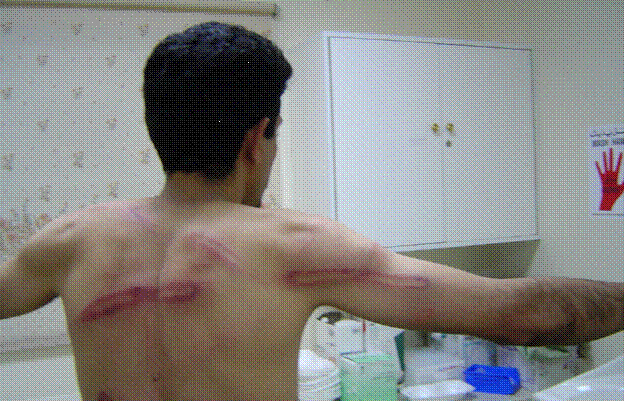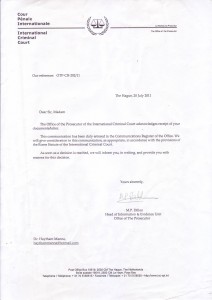Cases
6 years imprisonment for Saleh Al Saeed in the case of insulting Saudi Arabia Kingdom
Court of Appeals ruled today February 18, 2015 to imprison Saleh Saeed 6 years with work and execution for insulting the Kingdom of Saudi Arabia and the late King Abdullah bin Abdul Aziz Al Saud. He appeared in television channel and attacked Saudi Arabia and launched numerous accusations against King Abdullah, also repeated that in Tweets on Twitter.-----------------------------------------------------------
Letter from ICC to ICSFT in reply to its complaint together with 6 NGOs against ISIS
------------------------------------
No. of Death toll committed by ISIS in the Liberated areas in Syria
------------------------------
Request for ICC to investigate Crimes Committed by ISIS Terrorist Group in Iraq and Syria States
 Six nongovernmental organizations prepared a joint request letter, asking ICC prosecutor Ms. Fatou Binsouda to personally investigate the crimes committed by ISIS terrorist group
In this request letter which was prepared by the German-Iraqi Society, Int. Council Supporting of Fair Trials and Human Rights, Organization for Defending Victims of Violence, International Organization for the Fight against Terrorism and Religious Extremism, Zahra Human Rights Institute, and the Rights of Muslims in Belgium Institute, while pointing out the history of this terrorist group, it has been stressed that the leaders and members of this terrorist group are international criminals.
A number of examples of the crimes that have been committed by ISIS have been mentioned in this letter, they include: kidnappings, wreaking terror and havoc, destruction of places of worship and shrines, sexual rape, slavery, extrajudicial and mass executions, arbitrary and extrajudicial detentions, torture and murders.
Part of the request letter reads: "In view of crimes linked to ISIS, the report of international institutions and the position of international personalities, the contents of UN Security Council Resolution 2170, as the highest international decision making authority with regards to international peace and security, the crimes committed by this terrorist group are clearly classified as genocide, crimes against humanity and war crimes."
At the end of the request letter, the six NGOs, on the basis of the contents of Article 13 of the Rome Statute, have asked the ICC prosecutor to personally take action and investigate and file charges against the leaders and members of the ISIS terrorist group.
Six nongovernmental organizations prepared a joint request letter, asking ICC prosecutor Ms. Fatou Binsouda to personally investigate the crimes committed by ISIS terrorist group
In this request letter which was prepared by the German-Iraqi Society, Int. Council Supporting of Fair Trials and Human Rights, Organization for Defending Victims of Violence, International Organization for the Fight against Terrorism and Religious Extremism, Zahra Human Rights Institute, and the Rights of Muslims in Belgium Institute, while pointing out the history of this terrorist group, it has been stressed that the leaders and members of this terrorist group are international criminals.
A number of examples of the crimes that have been committed by ISIS have been mentioned in this letter, they include: kidnappings, wreaking terror and havoc, destruction of places of worship and shrines, sexual rape, slavery, extrajudicial and mass executions, arbitrary and extrajudicial detentions, torture and murders.
Part of the request letter reads: "In view of crimes linked to ISIS, the report of international institutions and the position of international personalities, the contents of UN Security Council Resolution 2170, as the highest international decision making authority with regards to international peace and security, the crimes committed by this terrorist group are clearly classified as genocide, crimes against humanity and war crimes."
At the end of the request letter, the six NGOs, on the basis of the contents of Article 13 of the Rome Statute, have asked the ICC prosecutor to personally take action and investigate and file charges against the leaders and members of the ISIS terrorist group.
----------------------------------------------------
Release of Abdulla Al Shamy
The Egyptian Attorney General decided to release Al-Jazeera correspondent in Cairo, Abdullah Shami, after more than ten months in detention without trial, and about 140 days of hunger strike. He said «the AG», he agreed to release the 13 accused in the case of sit-fourth Adawiya including Al-Jazeera journalist Abdullah al-Shami, for their health conditions. For his part, Mohammad Zare head of the Arab Organization for Criminal Science, that the release of Shami has political significance should be invested, wishing to release the detainees and to keep the rest of the Attorney General the ball rolling. The planter that the case was not yet closed to be saved or forwarded to the arbitrator by the Attorney General. He pointed out that the right-Shami may appeal to the judiciary if subjected to violations and that many of the detainees have received large amounts of compensation even though the issue is a moral rather than physical. While Dr Saif Abdel Fattah, a political science professor, on the decision of the Attorney General, the release of al-Shami said: «Abdullah Shami will win».
Ashraf said Abbas, the general coordinator of the Observatory of journalists against torture, that Abdullah Shami victorious in the battle of the intestines empty, wishing to release Mohammed Sultan, son of the leader of the Muslim Brotherhood Salah Sultan, deserted his name among those released.
---------------------------------------
--------------------------
-------------------------
Lawsuit 2: The Violations committed by the sons of the King of Bahrain and some members of the royal family against civilians and activists of opinion in Bahrain Information and Evidence Unit Office of the ICC Prosecutor Post Office Box 19519 2500 CM The Hague The Netherlands 12 September, 2012 The International Council Supporting Fair Trial and Human Rights (ICSFT) supported by the Bahrain Forum for Human Rights have presented to Office of the ICC Prosecutor a detailed report about Human Rights abuses in Bahrain. This report specifically addresses the violations that the sons of the King of Bahrain and some members of the ruling family committed during the application of state of emergency “National Safety Law” against political activists and other civilians, whether in detention centers, custody, or at checkpoints. This special report shows the patterns of violations and torture practiced by Nasser bin Hamad, Khalid bin Hamad, the two sons of the King of Bahrain. The report also monitors the cases of torture that was directed by Khalifa bin Ahmed Al Khalifa, the Director-General of the Police Directorate of the southern province - and Nora bint Ebrahim Al Khalifa - Lieutenant in the Drug Management Department at Ministry of Interior, against peaceful protestors, whether they were doctors, teachers or civil society activists . Information contained in this report, in particular (cases of torture and abuses), was obtained by the Department of Monitoring and follow-up in Bahrain Forum for Human Rights from various sources: direct meetings conducted by members of the Forum. The Forum also benefited from the cases provided by Bahraini human rights entities, particularly Bahrain Center for Human Rights and monitoring committees in some civil society institution. The report also attempted to provide information about roles and responsibilities held by those involved in violations in the Bahraini government, and whether these powers and responsibilities given to them allow a purely security investigation, and therefore, torturing activists and civilians!. Both ICSFT and Bahrain Forum for Human Rights would like to emphasize that because of the continuing security measures and what reach us of prosecutions practiced by authorities against human rights activists, we reserve to revealing the names of the sources that we deal with in the preparation of the report, in addition to the reservation to the names of the victims who were violated for their safety and safety of their families, except what was published by human rights organizations or sites in the local press. The Forum alerts that the numbers of cases that have been recorded in this report are few compared to the large numbers which were tortured. The fear of exposure to detention or abuse had a great impact of the apology of many of those cases we met during the monitoring and follow-up to allow the publishing of their statements. The Forum as it understands the apologies expressed by the owners of these cases calls those who have information in the same context to provide it to the Forum on the email address for the importance of availability of new cases in the legal prosecution of perpetrators of Human Rights abuses. The (ICSFT) respectfully reminds all that the United Nations Declaration on the Right and Responsibility of Individuals, Groups and Organs of Society to Promote and Protect Universally Recognized Human Rights and Fundamental Freedoms, adopted by consensus by the UN General Assembly on 9 December 1998, recognizes the legitimacy of the activities of human rights defenders, their right to freedom of association and to carry out their activities without fear of reprisals. We would particularly draw your attention to Article 6 (b and c): “Everyone has the right, individually and in association with others: (b) As provided for in human rights and other applicable international instruments, freely to publish, impart or disseminate to others views, information and knowledge on all human rights and fundamental freedoms; (c) To study, discuss, form and hold opinions on the observance, both in law and in practice, of all human rights and fundamental freedoms and, through these and other appropriate means, to draw public attention to those matters” and to Article 12 (2): “The State shall take all necessary measures to ensure the protection by the competent authorities of everyone, individually and in association with others, against any violence, threats, retaliation, de facto or de jure adverse discrimination, pressure or any other arbitrary action as a consequence of his or her legitimate exercise of the rights referred to in the present Declaration.”______
Dr. Abdul Hameed Dashti and Dr. Haitham Mannaa to file a lawsuit against 50 Bahraini Regime figures at the ICC
Information and Evidence UnitOffice of the ICC ProsecutorMr. Moreno OcampoPost Office Box 19519 2500 CM The HagueThe Netherlands Date: 25 September, 2011 Ref: 1. Our Ref. 23/ICSFT/2011 2.Your Ref. OTP-CR-202/11 To: Mr. Moreno Ocampo, The ICC Prosecutor Taking note of the existence of agreements referred to in Article 98-2 of the Rome Statute and that under the Rome Statute, individuals or organizations may submit to the ICC Prosecutor information on crimes within the jurisdiction of the Court (“communications”) and that the Prosecutor shall analyze the information to determine whether there is a basis to launch an Investigation; Acting under the Rome Statute and procedures established for International Nongovernmental Organizations by the Office of the Prosecutor of the International Criminal Court; Taking note of numerous testimonies, media and open source reports on violations by Bahraini Ruling Regime of international humanitarian law, war crimes, crimes against humanity, and elements of genocide in Bahrain; Determining that the situation in Bahrain continues to constitute a threat to the lives of Bahraini Citizens, as well as a threat to international peace and security of the Arabian Gulf States; Hereby refers the situation in Bahrain to the Prosecutor of the International Criminal Court; They communicated to his Excellency what has been going on in Bahrain; brutal massacre and Human Rights abuses that are inflicted on the People of Bahrain. To complete the file and revive it, they referred to his kind consideration the crimes which were committed by the Bahraini Army and the fighting forces during the Bahrain uprising especially; during the prevail of the state of National Security which was controlled by Khalifa Bin Ahmed Al Khalifa. This accused person assumes the position of the high commander of the Bahrain Force and actually the customary ruler of this stage. Dr. Dashti and Dr. Mannaa requested the Prosecutor to investigate this complain with the above mentioned person and also with others who participated or helped him in committing the crimes included in this complain. The Office of the Prosecutor confirmed its receipt of the Lawsuit file and that it has been duly entered in Communication Register of the Office and it will be given consideration as appropriate in accordance with the provisions of the Rome Statute of the International Criminal Court._____________________
Egypt's judges complaint against the executive Authority
Some Egyptian judges decided to internationalize their cause because of the vicious attack on them from the executive Authority and to file a lawsuit in front of the International Criminal Court. We publish below a document called Egypt's judges, who announced that he would submit it to the International Criminal Court, based on the document adopted by the Seventh United Nations Congress on Crime Prevention and Treatment of Offenders, held in "Milan" of August 26 / August to 6 September / September 1985. Also adopted and proclaimed by General Assembly resolutions of the United Nations 40/32 of 29 November / November 1985, 40/146 of 13 December / December 1985 as followed: First: the lack of respect and observe the independence of the judiciary: Principle No. (1) The State shall guarantee the independence of the judiciary and enshrined in the Constitution or the law of the country. It is the duty of all governmental and other institutions to respect and observe the independence of the judiciary. Second: improper influences, inducements, pressures, threats and direct and indirect interventions: Principle (2) separating the judiciary in matters before them impartially, on the basis of facts and in accordance with the law, without any restrictions, improper influences, inducements, pressures, threats or interferences, direct or indirect, from any quarter or for any reason, such as the siege by demonstrators courts politicians belonging to the ruling party to prevent judges from exercising their work, for example, the siege of the Supreme Constitutional Court in Cairo. Third: decent non-interference in the work of the judiciary Principle No. (4) There shall not be any inappropriate interventions, or unwarranted, in judicial proceedings, are not subject to judicial rulings issued by the court to reconsider. This principle is without prejudice to judicial review or commutation by competent authorities, and in accordance with the law or mitigation of sentences imposed by the judiciary. Fortify the decisions and actions of judicial control and prevent the courts from considering any issues related thereto Example A: The case of the invalidity of the formation of the Constituent Committee for the Development of the Egyptian constitution. Example B: decisions of the President of the Republic amnesty for criminal offenders. (Scientific Composite & crimes of terrorism). Fourth: the imposition of restrictions on the right of judges to freedom of expression and association Principle No. (8) in accordance with the Universal Declaration of Human Rights, the right of members of the judiciary are like other citizens entitled to freedom of expression, belief, association and assembly, however, requires that judges shall always, in the exercise of their rights, tack to preserve the dignity of their office and the impartiality and independence of the judiciary. Principle No. (9) Judges shall be free to form associations of judges or other organizations to represent their interests and promote their professional training and to protect their judicial independence, and join them. Example: The threat to freeze activity Judges Club Fifth: the imposition of a way to set in judicial functions improper motives include discrimination on the basis of religion and political opinion Principle No. (10) must be located those selected for judicial office individuals of integrity and efficiency, and obtaining the appropriate training or qualifications in law. And must include any way to choose judges. Safeguard against judicial appointments for improper motives. May not be the selection of judges, be exposed to any person discriminated against on the basis of race, color, sex, religion or political views or other opinions, national or social origin, property, birth or status, that it is not considered discriminatory to require The candidate for judicial office must be a national of the country concerned. Sixth: breach of the security of judges Principle (11) guaranteed by law for judges properly spend the duration of their term of their jobs and independence, security, and access to adequate remuneration, conditions of service and their pension and the age of retirement Principle (12) Judges, whether appointed or elected, shall have guaranteed tenure until a mandatory retirement age or the expiry of their term of office, where such exists Payment draft amendment to the law of judicial authority to the Shura Council as a prelude to isolate 3500 sued the members of the judiciary (currently discussing the Shura Council). Isolate judges from judicial office in violation of the provisions of the Constitution and the law. Example: Isolating the former General Prosecutor; "Abdel-Meguid Mahmoud. Seventh: isolate and transfer of judges without legal way and in a retaliatory manner Principle (13) Judges shall be subject to suspension or removal only for reasons of incapacity or behavior that renders them unfit to discharge their duties. Executive Authority interference through the Ministry of Justice in the work of judges, to transfer some judges and to interrogate others. Example: the judge, "Mahmoud Hamza" has been moved from Cairo to "El Mahalla El Kobra" as punishment for a rule issued by him. This problem is still under discussion and a final decision regarding it had not been taken._________________________________________________________
فريق محامين يعرض بجنيف أدلة حول انتهاكات النظام البحريني
الجمعة, 22 يوليو 2011 عقد في مقر مجلس حقوق الإنسان التابع للأمم المتحدة الخميس في جنيف، اجتماع بين فريق من الحقوقيين يمثل أربعة عشر منظمة حقوقية عربية ودولية، ورئيسة المجلس لبحث الانتهاكات في البحرين. وقال عضو الفريق المحامي/ عبد الحميد دشتي أن اجتماعا آخر سينعقد في جنيف مع مفوضة الأمم المتحدة لحقوق الإنسان السيدة/ نافي بيلاي، وكذلك مع رئيسة المجموعة الأوروبية في لجنة حقوق الإنسان، حيث سيتم استعراض أدلة تؤكد ارتكاب قوات الأمن البحرينية جرائم ضد الإنسانية. وكان فريق المحامين التقى الإدعاء المدعي العام في محكمة الجنايات الدولية بلاهاي لويس مورينو اوكامبو، وعرض عليه شكوى تضمنت أدلة تدين النظام البحريني. من جهته، قال اوكامبو لقناة العالم أن التحقيق مع النظام البحريني بشان انتهاكاته بحق المتظاهرين لا يتم إلا بناء على طلب من مجلس الأمن على حد قوله. في هذه الأثناء، عطلت وزارة الصحة البحرينية توظيف نحو ستة عشر طبيبا نجحوا في امتحانات القبول واندرجت أسماؤهم ضمن قائمة الأطباء الذين سيتم توظيفهم العام الجاري. وكان الأطباء قد حصلوا على خطابات من إدارة الموارد البشرية ورسائل توظيفهم في يناير الماضي. واكدت مصادر مطلعة لصحيفة الوسط البحرينية ان الوزارة أسقطت أسماءهم من قائمة الأطباء الجدد المعينين. واوضحت الصحيفة أن مسؤولي وزارة الصحة ابلغوا الأطباء بأنه سيتم الاستعلام من وزارة الداخلية بشان احتمال اشتراكهم في حركة الاحتجاجات الشعبية او تطوعهم لمعالجة الجرحى والمصابين في مستشفى السليمانية. من جهته، أعلن مركز البحرين لحقوق الإنسان ان محمد البوفلاسة المعتقل في سجون النظام قد قضى في محاولة للتخلص من التعذيب الذي يتعرض له. وقال المركز ان البوفلاسة وهو شاعر وعسكري سابق، قد اعتقل خلال الاحتجاجات في البحرين بعد ان ألقى كلمة في الخامس عشر من فبراير الماضي في دوار اللؤلؤة، دعا فيها الى إصلاحات سياسية واقتصادية. واضاف المركز نقلا عن عائلة البوفلاسه انه معتقل في احد السجون التابعة للجيش الحكومي، ويتعرض لتعذيب نفسي وجسدي رغم اضرابه عن الطعام منذ فترة. ميدانيا، اندلعت مواجهات بين شبان بحرينيين وقوات امن النظام التي داهمت قرية بني جمرة، حيث اظهرت صور قيام قوات الامن باطلاق الرصاص والقنابل الحارقة والغاز المسيل للدموع ضد المحتجين. وقد اقتحمت قوات الأمن البحرينية بوحشية مسيرة سلمية نظمها مواطنون في قرية سار ليل الأربعاء الخميس، واطلق العشرات من عناصر الآمن العيارات النارية وقنابل الغاز المسيل للدموع على المحتجين وباتجاه المنازل التي كانت تعلو منها التكبيرات. كما اظهرت صور نشرت على الانترنيت مشاركة مرتزقة في قيادة عمليات قمع التظاهرات التي تشنها قوات امن النظام في البحرين. ويبدو في هذه الصور احد المرتزقة، وهو يوجه عناصر الأمن باستخدام القنابل الحارقة لمنع المسيرات في بلدة قرب العاصمة المنامة.--------------------------------------------------------------
27 August 2013 United Arab Emirates: UAE 94 trial violates the basic rights to fair trial and due process In the final hearing of a group of people collectively known as the "UAE 94", the Federal Supreme Court of Abu Dhabi sentenced 56 people, including prominent human rights lawyers Mohammed Al-Roken and Mohammed Al-Mansoori, to 10 years in prison. Eight others were sentenced in absentia to fifteen years; and five defendants were sentenced to seven years. The court acquitted 25 defendants, including all 13 women among the accused. The defendants were charged with, among other things, association with a group aiming to overthrow the country’s political system. Many of those sentenced are members of a local group, Al-Islah, which has been engaged in peaceful political debate for many years. A coalition of NGOs including the International Federation for Human Rights (FIDH), the Gulf Center for Human Rights (GCHR), the Cairo Institute for Human Rights Studies (CIHRS) and the Arabic Network for Human Rights Information (ANHRI) published today the second and final report of the judicial observation of the trial, which the groups call deeply flawed. The coalition mandated British human rights lawyer Melanie Gingell, a member of GCHR's Advisory Board, to observe the trial which started on 4 March and ended on 2 July 2013. Ms. Gingell was denied access to three hearings despite her compliance with the official regulations and procedures. The content of the report is based on information gathered through interviews conducted by Ms. Gingell with family members who attended the hearings, local human rights defenders and activists, as well as international and local media. The report, entitled United Arab Emirates: Criminalising Dissent, UAE 94 Trial Deeply Flawed, outlines how the trial of the UAE94 was marred by recurrent and serious breaches of internationally agreed standards of fair trial, and led to unfair convictions and the imposition of lengthy terms of imprisonment for 69 of the defendants, without giving them the right to appeal the harsh sentences. The four organisations further stress that most of the defendants were tried for exercising their legitimate rights to freedom of association and expression. “Judicial procedures sanctioning fundamental, legitimate human rights such as freedom of expression and association are unfair. All of those convicted solely on the basis of exercising these rights should be freed and the charges against them dropped,” stated Karim Lahidji, FIDH President. As the UAE authorities refused to grant access to independent observers and international media, they also cracked down on families of the defendants who published information about the trial through social media. On 8 April 2013, Abdullah Al-Hadidi, the son of a defendant, was sentenced to 10 months imprisonment for tweeting that allegations of torture (within the trial) should be investigated. “The complete blackout about the trial except through local media and the subsequent crackdown on the families of the defendants for denouncing fair trial violations were reported throughout the proceedings. The coverage by local media which published a series of prejudicial articles clearly demonstrates the political interference into these judicial proceedings,” declared Gamal Eid, Executive Director of the Arabic Network for Human Rights Information (ANHRI). The information collected by the observer led to the conclusion that the court was not independent and free to conduct the trial in a proper manner. Most of the basic principles and fair trial guarantees, as documented in the report, were violated. “The entire process of the trial did not meet basic international human rights standards, which has consequently led to an unfair trial and unjust sentences,” stated Khalid Ibrahim, Director of the Gulf Center for Human Rights (GCHR). The four organisations are further dismayed by the court's dismissal of the torture allegations that were repeatedly reported by the defendants. The UAE authorities have an international legal obligation to duly investigate these serious allegations of torture; failing to do so is a serious breach of the United Nations Convention Against Torture and Other Cruel, Inhuman or Degrading Treatment or Punishment ratified by the UAE in July 2012. The four organisations call upon the UAE authorities to initiate an immediate, thorough and impartial investigation into the allegations of torture, in addition to an independent inquiry into the conduct of the trial of the UAE 94. “We demand that charges against all those convicted solely on the basis of exercising their legitimate rights be dropped and that those imprisoned be released pending the outcome of the inquiry,” said Ziad Abdel Tawab, deputy director of the Cairo Institute for Human Rights Studies (CIHRS). The report is being released as news emerges from prison that some of those jailed in the case began a hunger strike on 31 July, with 20 detainees participating to protest the mistreatment they continue to be subjected to while in detention. Among those on hunger strike is human rights lawyer Dr Mohammed Al-Mansoori, whose shoulder has been dislocated in prison. In June 2013, during the Universal Periodic Review at the UN Human Rights Council, the UAE authorities vowed to guarantee fundamental human rights. FIDH, GCHR, CIHRS and ANHRI urge the UAE authorities to keep their promises and invite the UN Special Rapporteurs on torture, on freedom of expression and opinion and on the independence of judges and lawyers to visit the UAE and grant them access to those convicted in this case and particularly those who reported torture. The UAE must demonstrate to the international community that it is willing to take immediate measures to guarantee its compliance with its international legal obligations. For more information, please contact: 1. GCHR: Khalid Ibrahim, Co-Director, tel: +961 70159552, email: Khalid@gc4hr.org, www.gc4hr.org 2. FIDH: Arthur Manet (French, English, Spanish) - Tel: +33 6 72 28 42 94 (à Paris) – Email : presse@fidh.org, Audrey Couprie (French, English, Spanish) - Tel: +33 6 48 05 91 57 (à Paris) – Email : presse@fidh.org [for the Arabic version, Salma El Hoseini (Arabic, English)- Tel : + 20227960618] www.fidh.org 3. ANHRI: Gamal Eid, Executive Director, Cairo, Tel: +202 23964058, gamaleid@anhri.net 4. CIHRS: Ziad Abdel Tawab, Deputy Director, Cairo, Tel: +202-27963726, abdeltawab@cihrs.org
